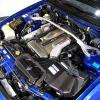Nitrogen Filled Tyres
Announcements
-
Similar Content
-
Latest Posts
-
RB20/25 covers don’t have threaded fasteners stock like RB26 covers. They are blind rivets so I will need to drill out and tap threads. I bought some M4x6mm button heads and will report back once done if I chose correctly length wise. have also got some loctite
-
Interesting. I've not dived into the cleanliness of the factory CAS. I'm curious if the variations are less of an issue if the OEM sensor were brand new. Optical sensors if they're starting to get dirt and crap into them as they're getting older would definitely cause issues as they age. It's an interesting point to keep in the back of mind for me though
-
Hmm. Tough one. Without knowing where the conductivity value is supposed to sit, it's hard to know whether a standard DMM set to an available ohms setting would be able to measure anything. Ohms being the inverse of what we're talkng about and probably good enough for the girls I go out with. But if you want to go all hoity toity with a 4 wire rig - go ahead. It can only be more accurate - just in case more accuracy or repeatability turns out to be required. If you're going to the effort, just go chuck the ohm-mage probes into the car's reservoir and see if you can measure anything at all?
-
So, barely torque them, but add a drop of Loctite just to be sure?...
-






Recommended Posts
Create an account or sign in to comment
You need to be a member in order to leave a comment
Create an account
Sign up for a new account in our community. It's easy!
Register a new accountSign in
Already have an account? Sign in here.
Sign In Now